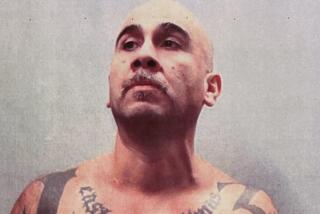L.A. County jail guards aid drug trading, sources say
Los Angeles County jail inmates have used corrupt guards to penetrate tight security at lockups, helping fuel a lucrative drug trade behind bars, according to interviews and documents reviewed by The Times.
Three sheriff’s guards have been convicted and a fourth fired in recent years for smuggling or attempting to smuggle narcotics into jail for inmates. Sheriff’s investigators are probing allegations that at least three more deputies took drugs or other contraband into the jails.
The porous nature of the jails was highlighted last week when The Times revealed that FBI agents conducted an undercover sting in which a deputy was accused of taking $1,500 to smuggle a cellphone to an inmate working as a federal informant. Federal authorities are investigating reports of brutality and other misconduct by deputies in the nation’s largest jail system.
The full scope of the smuggling problem is hard to quantify. The Sheriff’s Department has seen a significant increase in drug seizures across county lockups over the last few years, but it’s impossible to know how much of that involves guards.
In a sign of how serious officials consider the smuggling problem to be, the Sheriff’s Department recently recorded a former deputy, now in state prison, as he explained what led him to help inmates sneak in heroin, meth and marijuana.
In the video, Peter Felix tearfully recounts from behind bars how his fall from grace started with taking a burrito to an inmate. The video is meant to serve as a cautionary tale, and sheriff’s officials plan to show it to all of the department’s more than 9,000 deputies.
Sheriff Lee Baca said employees caught up in smuggling schemes are usually facing financial hardship. The deputy at the center of the FBI sting had six children from two prior marriages, commitments that consumed about 70% of his salary, Baca said.
“There are people who will falter,” he said.
James E. Blatt, an attorney who represented a sheriff’s custody assistant caught trying to smuggle five grams of heroin and two syringes into jail, said his client was a 19-year-old who lacked the training necessary to deal with wily criminals.
Keon Khatibi, he said, started doing harmless favors for an inmate leader in his assigned jail dorm at the Pitchess Detention Center in Castaic. The inmate eventually persuaded Khatibi to deliver drugs in exchange for about $1,000, Blatt said.
“They suck them in, and they’re very smart about who is young and vulnerable,” Blatt said. “This is their world and their system, and they know how to manipulate.”
Khatibi was sentenced last year to 180 days in jail.
Sheriff’s Lt. Greg Thompson said training in how to deal with inmates must strike a balance: Deputies can’t be so constantly paranoid that inmates are trying to manipulate them that they shut off the communication needed to get crucial jailhouse intelligence.
“There’s a fine line there,” said Thompson who works in the custody investigative services unit.
The problem is not confined to guards.
Two nursing assistants smuggled food and clothes to an inmate, according to county disciplinary reports. A federal judge on Tuesday sentenced Angelica Mora, a former employee for a private food vendor in the jails, to 21/2 years in prison for attempting to smuggle heroin into the North County Correctional Facility.
Among the cases still under investigation is that of Deputy Jose Giron, who is accused by inmates of smuggling heroin to a childhood friend behind bars.
According to a district attorney’s memo, Giron’s friend provided sheriff’s investigators with the following account of what happened: He and Giron had met in middle school but had parted ways. More than a decade later, Giron recognized the inmate inside the Pitchess Detention Center.
The inmate eventually asked if Giron would be willing to smuggle a particular pair of Air Jordans into the lockup for him and offered the deputy $1,200.
Giron was initially reluctant but eventually agreed. The inmate gave the deputy his sister’s telephone number, and Giron told him a buddy would call to arrange the transfer.
Phone records obtained by investigators showed that the deputy’s brother-in-law called the inmate’s sister, according to the district attorney’s memo. The sister told sheriff’s officials she gave heroin, cash and the shoes to a man who described himself as the brother of the deputy.
Days later, according to the June memo from the district attorney’s office, Giron delivered three balloons of heroin — worth $30,000 in jail — concealed in a new set of jail clothing.
Giron’s brother-in-law denied receiving drugs from the inmate’s sister but also “stated he was not a ‘snitch,’ ” the district attorney’s memo says. The deputy adamantly denied providing the inmate with narcotics and told investigators he did not know why a childhood friend would accuse him of a crime.
Two more inmates reported seeing Giron provide the drugs. But the district attorney’s memo, written by Deputy Dist. Atty. Paul Nunez, expressed concern about their credibility.
One of the inmates, Nunez wrote, was a convicted murderer who had provided “a large amount of useful information to detectives on a number of deputies” but had “failed to inform investigators of other deputies who were actively bringing in narcotics for him.”
In declining to file charge against Giron, Nunez wrote that investigators never recovered physical evidence — drugs, shoes or cash — and described the deputy’s accusers as criminals whom jurors would conclude were not credible.
Giron’s attorney, Richard A. Shinee, described the deputy as well-respected and accused the inmates of making false accusations. “It’s all smoke and mirrors created by a couple of con artists who were in jail and trying to buy off more time,” he said.
Authorities have successfully used Giron’s childhood friend to identify a corrupt deputy in the past and said he is involved in ongoing investigations. Law enforcement officials asked The Times not to name him because of concerns for his safety.
Giron has been placed on leave by the Sheriff’s Department. A department source said Giron’s case would be referred to the U.S. attorney’s office next week for possible federal prosecution.
More to Read
Start your day right
Sign up for Essential California for news, features and recommendations from the L.A. Times and beyond in your inbox six days a week.
You may occasionally receive promotional content from the Los Angeles Times.








